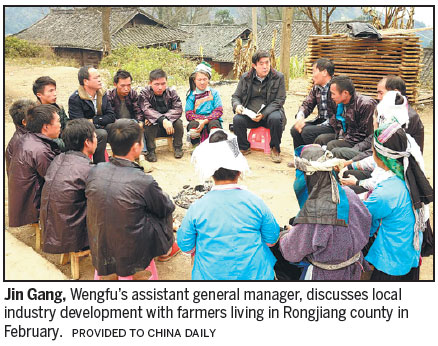Help for needy families, credit support for rural firms part of $1.4m pledge
Wengfu (Group) Co Ltd, one of the largest State-owned phosphorus and chemical manufacturers, pledged to spend at least 10 million yuan ($1.4 million) this year to support needy households and local industries, as part of its long-term commitment to poverty alleviation.
The company will step up its efforts to help cash-strapped families and offer credit support to rural industries, according to the Guizhou-based company.
Jin Gang, Wengfu's assistant general manager and a senior economist, said: "Wengfu has been striving to eradicate poverty, and will continue to do so in the years to come."
It is estimated that the initiatives could lift at least 5,000 people out of poverty, and increase income for 15,000 local people, in 2017, said Jin, who sat as a deputy of the National People's Congress, during the Two Sessions in Beijing.
According to the Government Work Report recently delivered by Premier Li Keqiang, the government has set goals to lift another 10 million people out of poverty this year through "tailored poverty relief policies and precision measures".
Last year, the number of people living in poverty was reduced by 12.4 million in rural areas, said the report.
"Poverty-stricken people" are categorized, by a standard China set in 2011, as those with an annual income lower than 2,300 yuan ($335).
Wengfu has said it had invested roughly 20.2 million yuan by the end of 2016. For example, it donated 320,000 baby chicks to poverty-stricken families and offered help with growing a special kind of rice last year, which has lifted more than 3,500 people out of poverty.
In addition, it pledged 500,000 yuan to fund 100 shortlisted candidates under the age of 18 in three-year occupational education - subsidizing the tuition and covering a proportion of their living expenses.
The program will empower young people working on farms and in factories through training, career opportunities and market access, Jin Gang said.
"In future, we will further expand occupational education and strive to eliminate discrimination in local areas."

